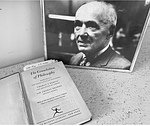THE STORIES BOOKS TELL US
The wall of bookshelves in my living room on Heyhoe Woods Road used to be filled with hundreds of scholarly works that belonged to my husband’s grandparents, Dr. Theodora Abel (PhD clinical psychologist) and Dr. Theodore Abel (professor of sociology). Most of these books haven’t been opened in fifty years.
During the counterculture 1970s, the Drs. Abel moved to Albuquerque and gave the house to their daughter Caroline and French son-in-law, Pierre Lalire. Pierre was a charming and hyperactive visual merchandiser for a string of prestigious department stores, including Lord & Taylor. He was also a prime instigator of the Snedens Landing “wine, women, and song” rat pack with Joe Hyde and Lee Savage, and not a big reader. Soon after he moved in, Pierre scanned the living room, pursed his lips, and declared the bookshelves “uuuugly.” His austerely imposing Polish father-in-law, and austerely imposing Vassar and Columbia-educated mother-in-law “deeed not have good taste.”
Pierre took down all the books that his in-laws had left behind, threw out all the dust jackets and rearranged the naked spines by color. Starting with a rectangle of rich, dark crimson on the left near the fireplace, he added a narrow column of striking beige and pale straw that faded into green and ended decisively with a large heavy block of dark blue and black on the right over the door to the front hallway. In subsequent decades, the titles on the spines faded into harmonious anonymity. Regardless of what was inside those books, our wall looked good. Pierre was a consummate visual professional.
Decades later, after Pierre’s passing, he left us a mountain of cartons filled with exquisite picture books that were his inspiration for countless elegant department store displays. Hundreds of these books had to be dealt with.
Our living room shelves were already full. We faced a ruthless winnowing to find space for the best of the newcomers. Like his father, my husband is not much of a reader. The unspoken dilemma; it would be my job, even though the books were from his family. Not only was I going to have to vacuum off a lot of moldy dust, but worst of all, I must weigh the importance of every volume. A task worthy of a pandemic. And a task with no rules. Important to whom? To civilization? To future generations? To me, and to whom else?
I thought I would start with the easy stuff. In the early 1940s, as the savagery of World War II convulsed the globe, Bennett Cerf at Random House decided to bring out a series of reprints called The Modern Library. Sized small and light to hold in one hand, printed in small font on cheap war-time paper and bound with distinctive markings in dark red, straw, pale green, dark blue, and black, the inexpensive books aimed themselves at the masses. The thrifty Drs. Abel bought dozens of them. Aha! These cheap little books drew my attention as the first ones I should get rid of.
The first volume I pulled off the shelf was called The Consolation of Philosophy. Wait! Right now, with a global climate crisis, a global pandemic and the outbreak of war in Ukraine, I deeply needed consolation. I flipped it open to the introduction. At the dawn of the Dark Ages, Roman civilization was crumbling. The author, Boethius, was a high court official condemned to death in 524 C.E. by the Christianized emperor Theodoric on trumped up charges of treason for trying to defend the Senate’s fading legitimacy.
Locked in a filthy cell, the last educated high Roman official we know of spent the weeks before his execution coolly setting down on paper his unshaken belief in the power of reason, justice, and goodness, while staring into the gaping mouth of a thousand-year-long tunnel of cultural darkness.
How might that book have gotten to my living room? This is where the story becomes personal, and person- ally agonising. As a young man in his early twenties, Theodore Abel, a Polish intellectual, lived through German occupation of his hometown Łodz during WW I, and then fought in the Polish-Soviet War of 1918 – 21. He was captured by the Russian Bolshevik army and barely escaped with his life. Twenty years later in 1943, when the Modern Library edition I held in my hand was published, two of Theodore Abel’s brothers and their families still lived in Łodz, now renamed Litzmannstadt by the occupying German Wehrmacht, which was actively “Germanizing” the population by exterminating the city’s large Jewish population and crushing all opposition from Polish intellectuals and civic leaders in the gruesome Radogoszcz prison and in the ditches of the Łagiewniki forest.
Each night, as Theodore and Theodora Abel sat down to dinner in what is now our Palisades dining room, they had to digest this horrifying news along with their daily bread. In 1944, the Abels’ college-aged son, Peter, was drafted; he was captured by the Germans after the Battle of the Bulge and missing in action for weeks. By the end of the war, both of Theodore’s brothers in Poland were shot to death, one by the Germans in Mauthausen Concentration Camp, and one by the Russians in Warsaw.
Although separated from the barbaric violence by thousands of miles, the Abels struggled to keep on functioning under an unbearable weight of helpless dread. One of them bought this book to nourish a belief in the power of reason, justice, and goodness. Now, bristling with post-it notes, the book has once again moved upstairs to my bedside table.
Boethius asked familiar questions: “Why is Evil so Powerful?”, “Why Was I Born?”, ”Why is Fortune so Cruel?”. He wrote down eternal answers: “Find True Happiness Within Yourself,” ”Fortune Cannot Destroy Reason,” “Law Cannot Be Imposed on a Free Spirit,” and best of all, “Love Unites, Strife Divides.” Boethius found stability in his soul by turning from his present fix to the contemplation of indestructible reason in eternity. It’s just as the Modern Library was intended; fifty years later, once again, someone like me had stumbled across ideas that should never be forgotten. Yes…consolation. Don’t put that one in the give-away box quite yet!
And now, for the next book…


